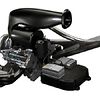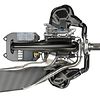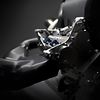Renault takes lid off of 2014 F1 turbo engine

Renault has unveiled images and further information of its ongoing engine project, set up to design a turbo charged Formula One engine for 2014. The firm has its engine already running firmly on the dyno with still a year to go before its expected debut.
F1 is about to undergo one of the most important transformations in its history. After a seven-year period during which engine specifications were frozen, the new regulations due to come into effect in 2014 will see engine makers play a central role in the cars’ overall performance. By placing engines at the very heart of the sport once again, Formula One will stand out more than ever as a showcase for cutting edge technology.
The rule changes that push for higher fuel efficiency and increased road relevance include a downsized internal combustion engine, evolving from a 2.4 litre V8 to a 1.6 litre V6. Turbocharging by means of a single-stage compressor will be introduced, engine revolutions limited to 15,000 rpm and fuel consumption for an entire race limited to 100kg. This will be teamed to a new ‘Energy Recovery System’ (ERS): kinetic energy (ERS-K) and exhaust heat energy (ERS-H) is recovered by two electric motor-generator units named MGU-H and MGU-K.
Renault specifies its engine to weigh approximately 155kg (compared to 95kg of current engines) and producing around 600hp for the internal combustion and 160hp from the new energy recovery systems.

Renault CEO Carlos Ghosn noted: “Renault’s continued involvement in Formula 1 serves to showcase our technological expertise on the racetrack and also contributes to the progress of our road vehicles. In each of these areas that entails delivering the ideal balance between performance, fuel consumption and reliability."
"For more than 35 years, F1 has helped Renault to develop its expertise in fields such as downsizing, friction reduction and cooling. With the new regulations, the use of electrical power stands to take on an increasingly important role in the development of powertrains, and that fits perfectly with Renault’s strategic commitment to electric vehicles.”







